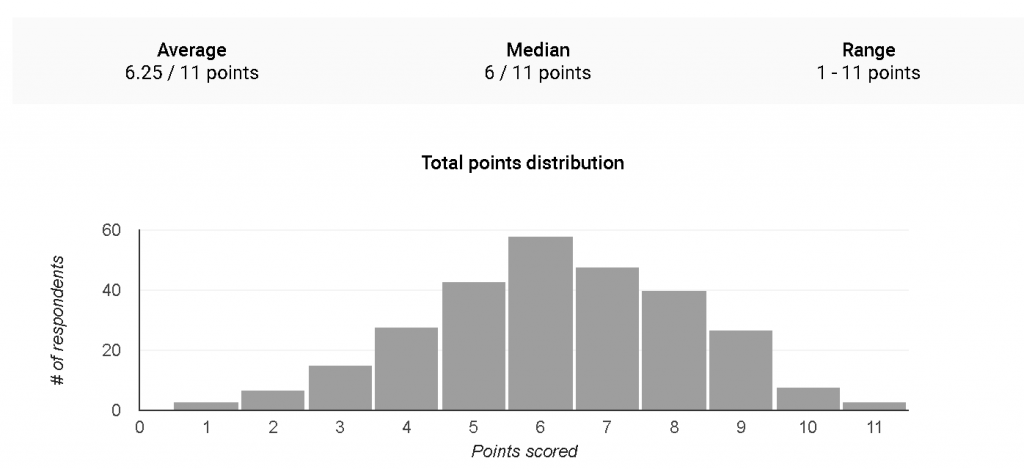Search
Ok, let’s see how you guys did on yesterday’s social media policy quiz

Yesterday, in this blog post, I asked you to take this quiz. That’s the one where you were shown 11 common social media policies and had to decide which ones the National Labor Relations Board’s Office of General Counsel would conclude were lawful.
So, how did you do? You did aight.
For sure, these were not easy. The median score was 6/11, which is barely better than a coin toss, and just three cheaters people scored 100%.
Here is the OGC memo, which explains in detail which ones were facially lawful and which ones weren’t. What I’ll do below is highlight the policies that tripped up most of you.
By far, the one that most people missed is this one:
Protect personal and confidential information. Our Code of Conduct makes clear the importance of protecting the privacy and security of PHI [protected health information], PII [personally identifiable information], and employee information. It is not permissible to disclose this information through social media or other online communications.
This policy is facially unlawful. But why? It’s the words “employee information.” According to the OGC, “Employee information” would reasonably be read by employees to include employee contact information and other non-confidential employment-related information, in which case prohibiting its disclosure would significantly restrict employees from [discussing their terms and conditions of employment with one another.]”
Yeah, I know. That was tricky. But, if you put the period after PII, that policy is otherwise good to go.
How about this one?
Leave employee recommendations to the formal process. Professional Employment recommendations, references or testimonials regarding current and former Employees should not be made in a social media posting. These are matters to be handled by the HR Department.
Nearly two-thirds of you said that this policy is unlawful. And that means that only one-third of you were correct that this policy is a-ok. Here’s more from the OGC:
Read in context, employees would understand that this rule—which mentions professional employment recommendations, references, etc.—was intended to protect the Employer’s legitimate managerial interests concerning references for a current or former employee. The rule is thus akin to rules ensuring that only authorized employees may speak on the Employer’s behalf, and employees would not reasonably construe it to prohibit them from writing testimonials about mismanagement that affects working conditions.
Now, how about that Twitter bio restriction?
For Twitter or other similar platforms with very restrictive word count allowances – use one of the following options at the end of your bio. (It is not necessary to include this information in actual posts): (a) Tweets my own; (b) Views my own; or (c) All thoughts my own.
We see them a lot. But, can an employer require one? According to the Board, yes:
[T]e rule’s disclaimer requirements are in support of the Employer’s legitimate business interest in ensuring that only authorized personnel speak on its behalf and are not unlawful. In particular, we note that the requirements for Twitter and other similar platforms with restrictive word count allowances are not burdensome—employees only need to post one of the disclaimers at the end of their Twitter bio, not after every “tweet.” And, although the disclaimers are in singular form, employees would not reasonably construe them as restricting Twitter messages reflecting concerted action.
Yep, this is not easy. And here’s the thing. This is just an OGC Memo; not a Board decision So, even the three nerds with the perfect scores may end up getting a few wrong when/if the full Board weighs in. And then, if the Board composition changes, so might its interpretation of the social media policies.
So good luck and be sure to keep your employment illunattorney on speed-dial.
 The Employer Handbook Blog
The Employer Handbook Blog


